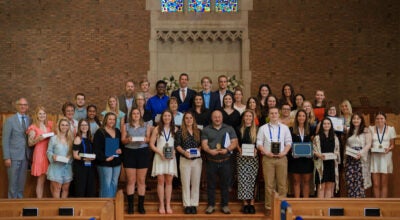COVID-19 pandemic produces some enrollment declines at Rowan-Cabarrus Community College
Published 12:00 am Wednesday, September 2, 2020

- Salisbury Post file photo - Rowan-Cabarrus Community College hosted the grand opening of the new North Campus Building 600 to the public in April 2016.
SALISBURY — Rowan-Cabarrus Community College was expecting some decline in enrollment because of the COVID-19 pandemic, and that decline was reported on this week during a regular meeting of the college’s board of trustees.
Lynn Marsh, chair of the Academic and Student Engagement Committee, reported a 5.68% in full-time equivalent enrollment and a 1.33% decrease in headcount at the college, though updated figures provided by RCCC showed the decline decreased to 4.11% full-time equivalent students and .57% headcount drops.
The headcount for fall is just more than 7,000 students, but that number is rising as students enroll for minimester courses throughout the term.
Marsh said the pandemic affected the entire N.C. Community College System, and some institutions experienced full-time equivalent drops of 20%. The college also has taken on virtual appointments with applicants and campus drive-in events to reach more students.
On the whole, enrollment has been growing at RCCC for the previous five years. From 2015-2016 to the 2019-2020 academic year, RCCC saw roughly a 15% increase in enrollment. That makes RCCC is one of the fastest-growing community colleges in a state where community college enrollment has largely been in slow decline for more than a decade.
The state reported system-wide growth of 4.4% for the first time in a decade in February based on fall 2019 enrollment. That was before the COVID-19 pandemic reached North Carolina.
The college has moved 92% of its classes online for the fall semester and anticipates not being able to serve the same number of students in courses offered on campus. An example furnished by RCCC included health programs like radiography and occupational therapy assistance are able to accept far fewer students. Radiography is down 32.14%.
The cosmetology program, normally one of the college’s largest, is down by 48.54% The safety changes also affect technical fields like welding.
The college is following safety guidelines set out by federal, state and local entities including the Centers for Disease Control and Prevention, N.C. Community College System and local health offices.
The college never went fully online after restrictions began to be put in place during COVID-19. A select few courses, including law enforcement and emergency services training, were kept going and in-person because they are required for emergency responders to renew their certifications.
The college will begin a second eight-week term on Oct. 19, and new students can enroll in classes then as well.
“We do not want students to put their future on hold,” the college said in a statement to the Post. “We are here to serve our community to ensure we are prepared for the future.”




